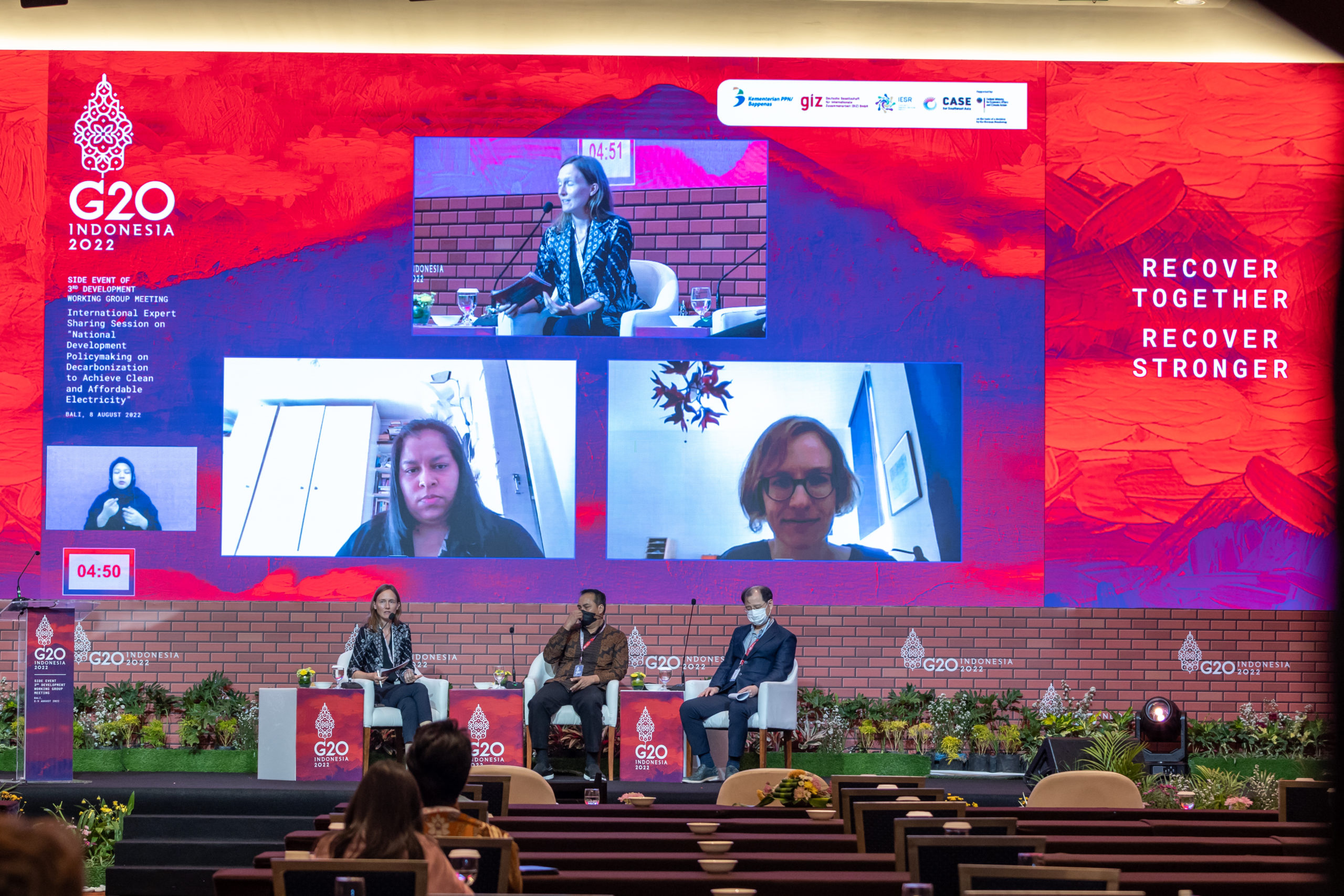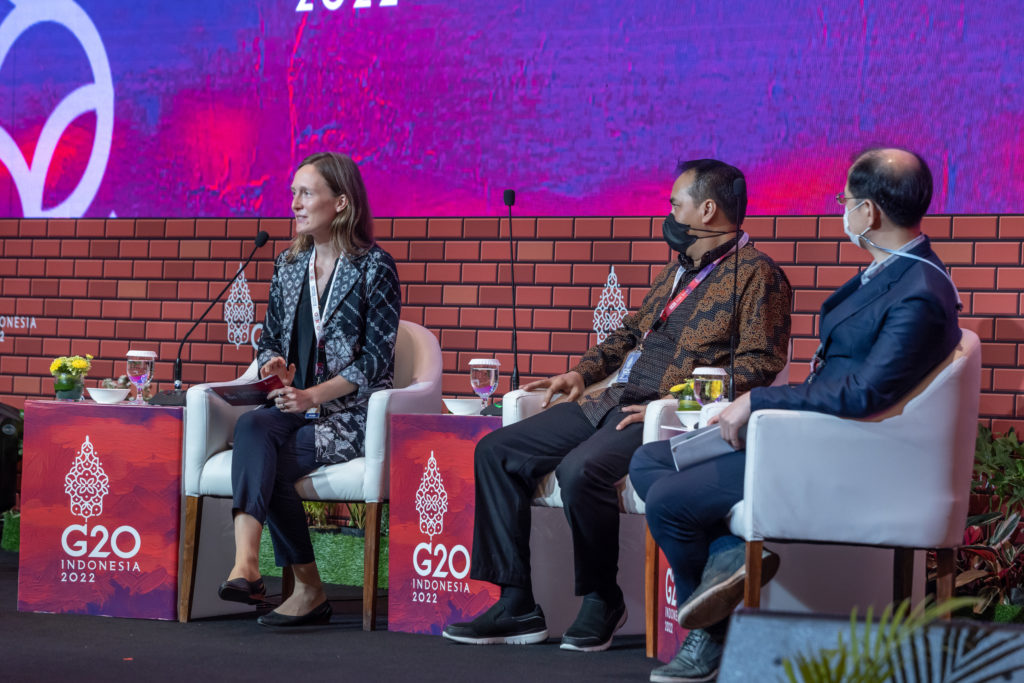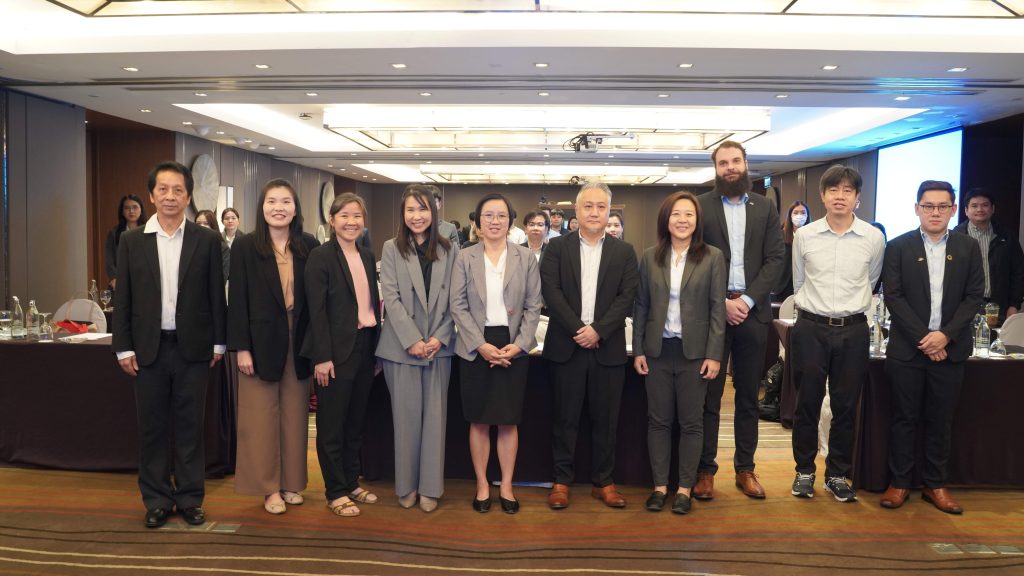Bali, 8 August 2022 – In its presidency for theG20 in 2022, Indonesia has chosen the energy transition as one of main three priority themes. The Development Working Group focuses on aligning ambitions to accelerate COVID-19 recovery and increase resiliency in developing nations, by strengthening global commitments towards sustainable development and climate change. Together with the Ministry of Development Planning/Bappenas, the Clean, Affordable, and Secure Energy for Southeast Asia (CASE) project organized a session on “National Development Policymaking on Decarbonization to Achieve Clean and Affordable Electricity”. The discussion focused on how to achieve net zero emissions through the decarbonization of the energy sector. The session connected energy, climate and development planning challenges with the discussion of concrete measures on how to achieve a coal phase out and upscale Renewable Energy (RE), by sharing experiences of a carbon tax in South Africa, RE incentives in South Korea, and hard coal auctioning schemes in Germany.

“There are over 700million people living without electricity. Having secure, clean, and affordable energy is needed, also in the spirit of inclusivity and should be accessible for all. Today’s dialogue may contribute to the energy transition roadmap” stated Raden Siliwanti, the co-chair of the G20 Development Working Group and Director of Multilateral Funding at the Ministry of National Development and Planning/Bappenas in her opening remarks.
Jadhi Judodiniar Ardajat, Chief Planner from the Director of Electricity, Telecommunications, and Informatics at Bappenas, emphasized the need and challenges for a holistic planning of energy, climate and development strategies. He reiterated Indonesia’s 2045 vision, allowing the country to get out from the middle-income trap while ensuring to achieve a green economy and low carbon development fueled by clean energy. “In the medium national development plan, we target to have renewable energy share of 20% from the total power plant installed in 2024. This would translate to greenhouse gas emission reductions by 75% of the power plants’ emission reduction target in 2030.”
Project Lead on Energy Policy of Southeast Asia at Agora Energiewende, Dr. Tharinya Supasa, emphasized that G20 countries make up 80% of the world’s GDP, and are responsible for approximately 80% of global greenhouse gas emissions. Meanwhile, subsidies for fossil fuels are still substantial—around USD 3.3 trillion alone between 2015 and 2019. It is, therefore, imperative for the G20 member countries to strive for Net-Zero Emissions (NZE) in the 2030-2040s to mitigate the climate crisis. Comparing some of the G20 countries, namely Indonesia, Germany, South Korea, and South Africa, Dr. Supasa stated that more share of COVID-19 recovery spending must be allocated to green spending. With current strategies and targets, none of the G20 countries are set to achieve their NZE ambitions in line with the Paris Agreement to limit global warming to well below 2 Degree Celsius.
The South Korean government stated its ambition to achieve its NZE target of 2050 through the bolstering of industrial research and development on carbon-neutral technologies, low-carbon materials, parts and equipment. Seungchan Chang, Korea Energy Agency’s Technology Certification Team Lead at the New and Renewable Energy Division, elaborated South Korea’s main strategy to foster renewable energy and other low-carbon manufacturing industries. “The Korean government wants to proceed with the clean energy transition in more practical and realistic ways with a direction of cutting down fossil-energy share progressively, and improving energy security,” said Seungchan.
The event further allowed for a fruitful exchange on concrete measures taken by G20 countries to decarbonize the power sector. With 80% of South Africa’s greenhouse gas emissions coming from fossil fuel combustion, the country introduced a carbon taxation system as an instrument to incentivize greenhouse gas emissions reductions. “The carbon tax policy was developed over a decade,” explained Sharlin Hemraj, the Director of Environmental and Fuel Taxes at the National Treasury of South Africa. “The design of the carbon tax aims to minimize potential adverse impacts on low-income households … Most of the revenue collected from the carbon tax is recycled to fund measures to help ensure a just transition to a lower carbon economy,” she continued. She further concluded that South Africa’s carbon tax, which is now set at around US$8.58 per ton of carbon dioxide equivalent, will be revenue neutral and have no impact on the price of electricity during its first phase. This is thanks to several tax incentives and credits that may reverse these potential negative impacts. “The South African government intends to increase the carbon price more rapidly every year, to at least US$20 by 2026, and up to US$120 beyond 2050,” she continued. She further highlighted the importance of integrating the concept of a just transition across energy and carbon regulation, and noticed on the high relevance for an inclusive, participative process for policy-development, including the identification of champions. Meanwhile, Germany had committed to phase out the use of coal by 2038 on top of its NZE resolution by 2045, with the current Governments ambition to move the coal phase out date forward. Anne Baguette, Economic Advisor of the Federal Agency Network—Germany’s power and gas regulator—explained about the country’s measure to phase out hard coal through an auction process. “In the first four years of the auctioning system, we implement the tendering mechanism with a decreasing compensation each year to incentivize participation in the early years, in the last term, there will be no more tenders, so we will just issue administrative orders to the coal plants without any compensation,” she explained. She highlighted that the first three tendering rounds were oversubscribed, demonstrating the recognition of hard coal operators that coal will not play a role anymore in Germany’s future power system.
Discussing the impact of the current global energy crisis on emission and coal phase out targets as well as energy poverty and just transition, there was strong emphasis by all countries that the commitment to NZE and upscaling of RE remains fully intact. The crisis has shown the potential of RE to increase energy security and independence while providing affordable and clean energy. It also showed the heightened importance put towards energy efficiency and energy conservation by countries, giving the panel discussion a positively framed ending, that a crisis can turn into an opportunity, e.g. accelerating the energy transition.
Lisa Tinschert, the Director of Energy Programme at GIZ Indonesia, concluded the session by restating the importance of power system decarbonization. “Cooperation and exchange [for decarbonization] is important, countries cannot plan the energy transition by themselves, so we don’t have to tackle these big challenges by ourselves,” she said in her closing remarks.




